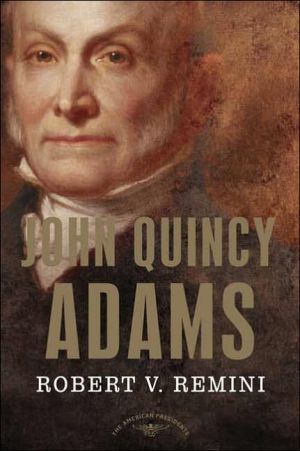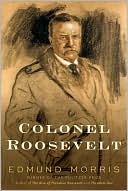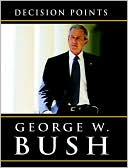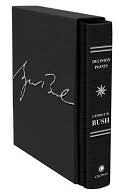John Quincy Adams (American Presidents Series)
A vivid portrait of a man whose pre- and post-presidential careers overshadowed his presidency.\ Chosen by the House of Representatives after an inconclusive election against Andrew Jackson, John Quincy Adams often failed to mesh with the ethos of his era, pushing unsuccessfully for a strong, consolidated national government. Historian Robert V. Remini recounts how in the years before his presidency Adams was a shrewd, influential diplomat, and later, as a dynamic secretary of state under...
Search in google:
A vivid portrait of a man whose pre- and post-presidential careers overshadowed his presidency.Chosen by the House of Representatives after an inconclusive election against Andrew Jackson, John Quincy Adams often failed to mesh with the ethos of his era, pushing unsuccessfully for a strong, consolidated national government. Historian Robert V. Remini recounts how in the years before his presidency Adams was a shrewd, influential diplomat, and later, as a dynamic secretary of state under President James Monroe, he solidified many basic aspects of American foreign policy, including the Monroe Doctrine. Undoubtedly his greatest triumph was the negotiation of the Transcontinental Treaty, through which Spain acknowledged Florida to be part of the United States. After his term in office, he earned the nickname "Old Man Eloquent" for his passionate antislavery speeches. Publishers Weekly John and Abigail Adams's son was arguably the most brilliant man ever to occupy the White House. He was also probably the least temperamentally fit to do so. Nevertheless, as this straightforward biography reminds us, John Quincy Adams (1767- 1848) led one of the longest, most illustrious and most consequential public careers in the nation's history. Remini, the great modern biographer of Andrew Jackson, might seem the wrong choice to write a life of one of Jackson's most implacable enemies. But in this addition to a series on the presidents edited by Arthur M. Schlesinger Jr., Remini, a National Book Award winner, paints an admiring portrait of an extraordinary man. Depicting Adams as deficient husband and father and disputably holding his famous parents largely responsible for the torments in all their children's lives, Remini concentrates on Adams's 50-year public career, much of it spent abroad. Remini is surely justified in holding Adams out as the nation's greatest secretary of state, largely responsible for what we know as the Monroe Doctrine. Although Adams as president was out of touch with most of his fellow citizens, it's likely that no one could have succeeded in the White House given the political confusion of those years. Adams's post-White House years (he was one of only two ex-presidents to return to Congress) yielded some of his life's greatest triumphs. He laid the basis for the Free Soil movement that eventually helped defeat slavery, protected the bequest that gave us the Smithsonian Institution and, as many readers will know from the film, defended the Amistad slaves. No one who reads this fine, short study will fail to place Adams in the pantheon of Great Neglected Americans-which is just what Remini hopes to achieve and does.
John Quincy Adams\ \ By Robert V. Remini \ Times Books\ Copyright © 2003 Robert V. Remini\ All right reserved.\ ISBN: 0-805-06939-9 \ \ \ Chapter One\ A Privileged Young Man \ Toward the end of the presidential campaign of 1824, John Quincy Adams, one of the four candidates for the office, left his duties as secretary of state in Washington and returned to his home in Quincy, Massachusetts there to roam around the cemetery and look at tombstones of his ancestors and meditate on the past and future. He walked among the graves of the four generations of his father's family. He singled out the tomb of Henry Adams, the first to come from England and settle in Braintree, now Quincy, around 1640; then there was Joseph Adams, Sr., and his wife, Abigail Baxter, and Joseph Adams, Jr., and his second wife, Hannah Bass.\ John Quincy Adams paused for a bit and gazed at the grave of his paternal grandfather, John Adams, Sr., and his wife, Susannah Boylston. The family continues to grow, he mused. Now, in 1824, there were three succeeding generations of male Adamses still living: his father, John Adams, the former president; himself, the present secretary of state, and his brother, Thomas Boylston; and then the third generation, among whom were his children: George Washington, John 11, and Charles Francis. "Pass another century," Adams noted in his diary, "and we shall all be mouldering in the same dust." I wonder, he added,"who then of our posterity shall visit this yard? And what shall he read engraved upon the stones?"\ Since then another century and more have passed and surely those who look upon the graves of this family cannot but recognize that here lie the remains of supremely gifted men and women who served their country with distinction and added to its luster.\ The secretary did not mention his mother's ancestors in his musings - and that could be an important key in understanding his character and personality - but they too brought a degree of greatness to the family tree. He was named after his maternal great-grandfather, John Quincy, who "died on the 13th of July, 1767, the day after I had received his name in baptism," the secretary later wrote. His mother, Abigail Smith, the daughter of the Reverend William Smith and his wife, Elizabeth Quincy Smith, both descendants from distinguished Massachusetts clergymen, was a feisty woman of remarkable intelligence and determination, a woman of high moral standards who set goals for her offspring that they spent their lives trying to achieve.\ It was especially difficult for John Quincy Adams. He was the oldest boy in the family, born July 11, 1767, but his sister Abigail, called "Nabby" by the family, had preceded him by two years. Another sister, Susanna, followed him but died the following year, in February 1770; then came Charles who arrived on May 29, 1770, and Thomas on September 15, 1772. Johnny, as the family called him, was perpetually lectured about how he was the oldest son and had to set an example for his siblings. He had been born with gifts few others enjoyed, they told him, and was expected to live up to them and become a "great man." Over and over, year after year, his parents reminded him that he was privileged by birth and education, that he was destined to be "a Guardian of the Laws, Liberty and Religion of your Country," and that he must achieve a distinction in this life that would add to the family's already illustrious record of accomplishment.\ Abigail actually took Johnny to Bunker Hill on June 17, 1775, to witness the famous battle so that he could better understand the price of freedom and the trials necessary to gain and defend it. He was all of seven years of age. Years later he still remembered "Britannia's thunders ... and witnessed the tears of my mother and mingled with them my own" over the death of "a dear friend of my father," Dr. Joseph Warren, who fell in the conflict. It seems unbelievable, but this young boy was made to stand and watch the killing of men he knew! It must have been traumatic. From that moment on Abigail "taught me to repeat daily, after the Lord's prayer, before rising from bed, the Ode of Collins on the patriot warriors who fell in the war to subdue the Jacobite rebellion of 1745."\ What a terrible burden to lay on a child. And because his parents relentlessly spelled out his duties, reprimanded him when he failed to live up to them, and corrected every move he made that seemed to contradict their expectations of him, it is not surprising that he developed into a very introverted, self-critical individual of enormous pride and low personal esteem who suffered periodic and deep mental depressions. In later years he admitted that he was "a man of reserved, cold, austere and forbidding manners." He recognized that people saw him as "a gloomy misanthropist" and "a social savage," but, he added, "I have not the pliability to reform it."\ He really yearned for the life of the mind. Literature, the arts, and science were what genuinely interested him. Instead the family decreed a life serving the law (which he hated) to be followed by public service, an essential component for the recognition expected of him. Although he had few political talents and refused throughout his life to do that which would actively advance his public career, still he loved the influence that came with high office. He loved the power by which he could advance the well-being of all the people, and he loved the accompanying acclaim that naturally flowed from it.\ His parents also drilled into him the importance of religion in his life and the obligation of maintaining strict observance of Christian moral values. When he took his first long trip away from home at the age of ten, Abigail admonished him to "adhere to those religious sentiments and principles which were early instilled into your mind, and remember that you are accountable to your Maker for all your words and actions." She had seen her own brother succumb to alcohol and debauchery, desert his family, and leave them penniless. If it took every ounce of strength in her body, she meant to protect her children from a similar fate. "Your passions are strong and impetuous," she told her son, "and tho I have sometimes seen them hurry you to excesses, yet with pleasure I have observed ... your Efforts to govern and subdue them." All his life he kept up a lively battle "to govern and subdue" his passions, but his efforts never fully satisfied him. Johnny's father, one of the first New England Unitarians, weighed in on the subject by reminding him that "Your Conscience is the Minister Plenipotentiary of God Almighty in your Breast. See to it, that this Minister never negotiates in vain. Attend to him, in Opposition to all the Courts in the World."\ Like the dutiful son he remained through life, John Quincy Adams adhered to these admonitions and, as an adult, read the Bible each morning for an hour in English, French, or German. According to his lights, it was the proper way to start the day. He regretted not knowing Hebrew so he could enjoy the original. And on Sunday he invariably attended two and sometimes three church services of different denominations, depending on his evaluation of the minister's intellectual strengths and preaching ability. "There is scarcely a Sunday passes ..." he later wrote in his diary, "in attendance upon divine service, I hear something of which a pointed application to my own situation and circumstances occurs to my thoughts. It is often consolation, support, encouragement-sometimes warning and admonition, sometimes keen and trying remembrance of deep distress." Raised as an independent Congregationalist, he finally joined the Unitarian Church in Quincy upon his father's death in 1826.\ Naturally Johnny's education received special attention, particularly since he was expected to rise to greatness. He never went to school in Quincy but was educated at home by tutors: James Thaxter, his cousin, and Nathan Rice, one of his father's law clerks. Of course his parents took a very active role in his education. His father regularly instructed Abigail on Johnny's training. Fix his "Attention upon great and glorious Objects, root out every little Thing, weed out every Meanness," make him "great and manly." John Adams urged his son to revere scholarship as his "preeminent entertainment." Latin and Greek constituted the basic foundation for any educated man in the eighteenth century, and Johnny diligently memorized their grammar and vocabularies. In addition his father advised him to read history so that he could be better equipped to recognize evil and treachery in the world; and by all means he must study Thucydides' History of the Peloponnesian War in the original, "the most perfect of all human Languages," he was told. At the age of seven he wrote his father and said, "I hope I grow a better Boy and that you will have no occasion to be ashamed of me ... Mr. Thaxter says I learn my Books well - he is a very good Master. I read my Books to Mamma."\ Not surprisingly, considering his education at the hands of such God-fearing, New England Puritan descendants as Abigail and John Adams, their son developed a towering guilt complex and throughout his life readily admitted to his many failings. Even at an early age Johnny had begun berating himself for his inadequacies. "My Thoughts are running after birds eggs play and trifles, till I get vexed with my Self," he wrote at age ten. "Mamma has a troublesome task to keep me Steady, and I own I am ashamed of myself."\ It is amazing that he did not rebel over the demands placed upon him. Whatever anger raged within him, if such did exist, remained under tight control, although at times he later showed marked disrespect to his mother when he failed to answer her letters despite her frequent demands for a response. Toward his father he never seems to have had anything but the greatest respect and reverence. After all, John Adams was an extremely successful Boston lawyer, a man of the highest integrity who turned to politics when the British government passed the Intolerable Acts in 1774, which, among other things, closed the port of Boston and the courts of law. Sucked into the revolutionary stirrings rapidly developing, John Adams hurried off to Philadelphia to attend the Continental Congress where he joined a committee with Thomas Jefferson and Benjamin Franklin to write a Declaration of Independence.\ With the Revolution now in full swing the Congress appointed a diplomatic commission, consisting of Benjamin Franklin, Arthur Lee, and Silas Deane, to obtain European assistance for the country's struggle to gain its freedom from England. But when the Congress recalled Deane to answer charges of improper conduct at the French court, it replaced him with Adams.\ (Continues...)\ \ \ \ \ Excerpted from John Quincy Adams by Robert V. Remini Copyright © 2003 by Robert V. Remini. Excerpted by permission.\ All rights reserved. No part of this excerpt may be reproduced or reprinted without permission in writing from the publisher.\ Excerpts are provided by Dial-A-Book Inc. solely for the personal use of visitors to this web site. \ \
\ Publishers WeeklyJohn and Abigail Adams's son was arguably the most brilliant man ever to occupy the White House. He was also probably the least temperamentally fit to do so. Nevertheless, as this straightforward biography reminds us, John Quincy Adams (1767- 1848) led one of the longest, most illustrious and most consequential public careers in the nation's history. Remini, the great modern biographer of Andrew Jackson, might seem the wrong choice to write a life of one of Jackson's most implacable enemies. But in this addition to a series on the presidents edited by Arthur M. Schlesinger Jr., Remini, a National Book Award winner, paints an admiring portrait of an extraordinary man. Depicting Adams as deficient husband and father and disputably holding his famous parents largely responsible for the torments in all their children's lives, Remini concentrates on Adams's 50-year public career, much of it spent abroad. Remini is surely justified in holding Adams out as the nation's greatest secretary of state, largely responsible for what we know as the Monroe Doctrine. Although Adams as president was out of touch with most of his fellow citizens, it's likely that no one could have succeeded in the White House given the political confusion of those years. Adams's post-White House years (he was one of only two ex-presidents to return to Congress) yielded some of his life's greatest triumphs. He laid the basis for the Free Soil movement that eventually helped defeat slavery, protected the bequest that gave us the Smithsonian Institution and, as many readers will know from the film, defended the Amistad slaves. No one who reads this fine, short study will fail to place Adams in the pantheon of Great Neglected Americans-which is just what Remini hopes to achieve and does.\ \ \ \ \ Publishers WeeklyJohn and Abigail Adams's son was arguably the most brilliant man ever to occupy the White House. He was also probably the least temperamentally fit to do so. Nevertheless, as this straightforward biography reminds us, John Quincy Adams (1767- 1848) led one of the longest, most illustrious and most consequential public careers in the nation's history. Remini, the great modern biographer of Andrew Jackson, might seem the wrong choice to write a life of one of Jackson's most implacable enemies. But in this addition to a series on the presidents edited by Arthur M. Schlesinger Jr., Remini, a National Book Award winner, paints an admiring portrait of an extraordinary man. Depicting Adams as deficient husband and father and disputably holding his famous parents largely responsible for the torments in all their children's lives, Remini concentrates on Adams's 50-year public career, much of it spent abroad. Remini is surely justified in holding Adams out as the nation's greatest secretary of state, largely responsible for what we know as the Monroe Doctrine. Although Adams as president was out of touch with most of his fellow citizens, it's likely that no one could have succeeded in the White House given the political confusion of those years. Adams's post-White House years (he was one of only two ex-presidents to return to Congress) yielded some of his life's greatest triumphs. He laid the basis for the Free Soil movement that eventually helped defeat slavery, protected the bequest that gave us the Smithsonian Institution and, as many readers will know from the film, defended the Amistad slaves. No one who reads this fine, short study will fail to place Adams in the pantheon of Great Neglected Americans which is just what Remini hopes to achieve and does. (Aug. 20) Copyright 2002 Cahners Business Information.\ \ \ Library JournalRemini, the author of many books on Andrew Jackson, Henry Clay, and the politics of the 1820s and 1830s, here offers a brief biography of the sixth president of the United States as part of the American Presidents series edited by Arthur M. Schlesinger Jr. John Quincy Adams's four-year presidency was the least satisfying period in a long public career. He served as diplomat and Secretary of State prior to his election and became the only former president to sit in the House of Representatives, where he remained for 17 years during the increasingly stormy sectional debate. Remini focuses on important incidents throughout Adams's life, demonstrating that he was not the failure he would have been if judged only by his presidential years. Adams has been the subject of two recent longer biographies: Paul Nagel's John Quincy Adams: A Public Life and Lynn Hudson Parsons's capable but generally overlooked John Quincy Adams. Though the book is brief, in keeping with the series, Remini still manages to stay true to his scholarly credentials while targeting a general audience. Some endnotes are included that do not interrupt the flow of each chapter. Recommended for major public or academic libraries. Charles K. Piehl, Minnesota State Univ., Mankato\ \ \ \ \ Kirkus ReviewsBrief bio of one of our most capable and overlooked politicians, by the author of several well-received studies of the republic's early history (Andrew Jackson and His Indian Wars, 2001, etc.). Remini (History and Humanities Emeritus/Univ. of Illinois, Chicago) lays a claim for John Quincy Adams as "arguably the greatest secretary of state to serve that office": the architect of an honorable peace in the War of 1812, the true author of what has since been known as the Monroe Doctrine, the statesman who helped formulate important international treaties and maritime laws. As president, Adams was perhaps less effective. Under his watch, federal prerogatives gave way to the demands of individual states, so that, for instance, the state of Georgia was able to take control of land owned by the Creek Indian nation and supposedly protected by treaty. This clash of state and federal power would eventually, as Adams recognized, end in civil war. In the case of the Indian nations, it opened the door to policies that successor Andrew Jackson (whom Adams detested "with a vengeance") would vigorously pursue; a regretful Adams later concluded that in his lifetime Americans did more harm to Indians than did all the European powers combined. Though often not of his own making, Adams's failures in office contributed to his defeat in the electoral campaign of 1828: "the filthiest in American history," remarks Remini. Although this capable and thoughtful author has little apparent interest in psychobiography, he turns in some juicy tidbits, among them the fact that powerful mother Abigail's opposition contributed to the end of "the only romantic and passionate love of John Quincy Adams's entire life." Likehis subject, Remini prefers the practical and even mundane, which makes this latest in the American Presidents series a less-than-thrilling read. Still, it does Adams justice and well serves to acquaint readers with a neglected leader.\ \








